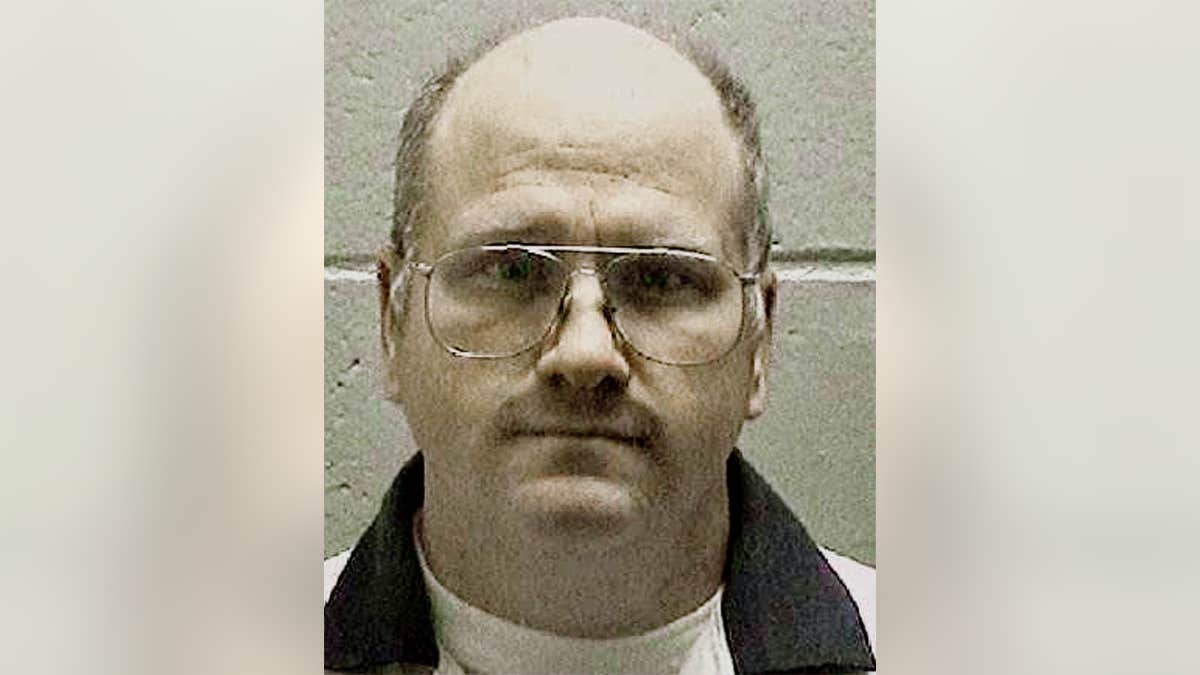
FILE -In this undated file photo released by the Georgia Department of Corrections shows death row inmate and former U.S. Navy sailor Travis Hittson in Georgia. Hittson, 45, is to scheduled be put to death Wednesday evening, Feb. 17, 2016. (Georgia Department of Corrections via AP, File)
JACKSON, Ga. – A former Navy crewman was executed Wednesday in Georgia for killing a fellow sailor whose remains were found buried in two states.
Travis Hittson, 45, was declared dead at 8:14 p.m. by Warden Bruce Chatman after receiving an injection of the barbiturate pentobarbital at the state prison in Jackson. He was convicted in the April 1992 killing of Conway Utterbeck.
When Chatman asked if he wanted to make a final statement in front of witnesses, Hittson said, "No, sir. I'm alright." He then agreed to have a prayer read.
Georgia doesn't announce exactly when the lethal drugs begin flowing, and the injection isn't visible to observers. But the warden left the execution chamber at 8:04 p.m., and records from past executions show the lethal drug generally begins to flow within a minute or two of the warden's departure.
Hittson blinked repeatedly for several minutes and then appeared to take several deep breaths before becoming still about four minutes after the warden left the execution chamber.
Hittson's lawyers had said he was mistreated and neglected as a child and constantly craved the approval of others. That, they said, combined with alcoholism and relatively low intelligence, made it easy for his direct supervisor in the Navy, Edward Vollmer, to manipulate him into killing Utterbeck.
The State Board of Pardons and Paroles, which is the only entity in Georgia authorized to commute a death sentence, on Tuesday denied Hittson's request for clemency. The board didn't give a reason for the denial, which is standard.
Hittson's lawyers also contended in a court filing that his constitutional rights were violated during sentencing when a judge allowed a state psychologist who had examined Hittson to recount damaging statements Hittson had made about Utterbeck.
A Butts County judge on Tuesday rejected those arguments and the state Supreme Court on Wednesday rejected an appeal of that decision and denied a stay of execution.
The U.S. Supreme Court also declined to halt the execution.
Hittson, Utterbeck and Vollmer were stationed in Pensacola, in the Florida Panhandle, in April 1992 when they went to Vollmer's parents' home in Warner Robins in central Georgia for a weekend.
Hittson told investigators he and Vollmer went out drinking the second night they were there, leaving Utterbeck at the house. As they were driving back to the house, Vollmer told Hittson that Utterbeck planned to kill them both and that they needed to "get him" first, according to court filings.
When they reached the house, where Utterbeck was sleeping in a recliner, Vollmer put on a bulletproof vest and took a sawed-off shotgun and a handgun from his car and gave Hittson an aluminum baseball bat. On Vollmer's instructions, Hittson hit Utterbeck several times in the head with the bat and then dragged him into the kitchen where Vollmer was waiting, according to court filings. Vollmer stepped on Utterbeck's hand and Hittson shot him in the head, according to court filings.
Vollmer said they needed to cut up Utterbeck's body to get rid of the evidence, according to court filings. Hittson told investigators he began to cut the body with a hacksaw but he became sick and Vollmer finished dismembering the body, according to court filings.
They buried Utterbeck's torso in Houston County in central Georgia and brought the rest of the remains back to Pensacola and buried them there.
When investigators began questioning Utterbeck's shipmates a couple of months later, Hittson confessed and also implicated Vollmer, according to court filings. He led investigators to Utterbeck's remains and other crime scene evidence.
Hittson was convicted of malice murder, aggravated assault, possession of a firearm during the commission of a crime and theft by taking. He was sentenced to die for the malice murder conviction.
Vollmer reached a plea deal and is serving a life sentence. He was denied parole in 1999 and again last year. Reconsideration of his case had been set for 2020, but based on information offered at Hittson's clemency hearing, the parole board on Wednesday reset that for 2024. Eight years is the maximum delay between consideration dates allowed by board rules.
Hittson was the second person executed in Georgia this year. The state executed five inmates last year, the most it has executed in a calendar year since 1987.









































